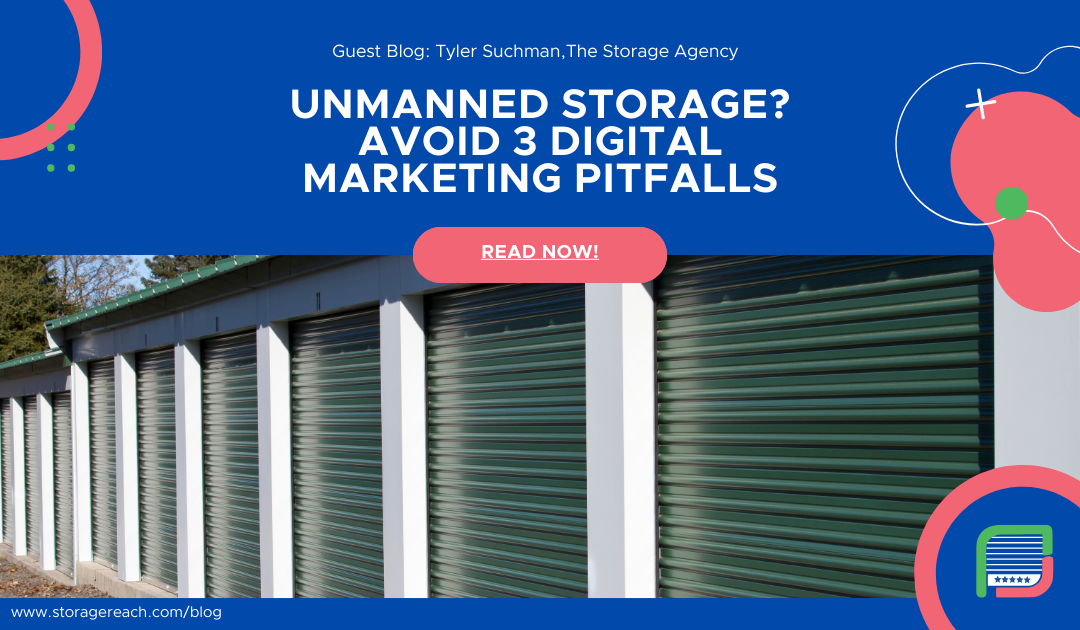An unmanned storage facility operates without full-time, on-site staff. Instead, it uses technology to create an automated rental and facility management experience. Customers might initially rent a unit via the facility website, an on-site kiosk or hopping on the phone with an off-site (or even offshore!) representative.
After completing the rental, the new customer receives a gate code via text or email for immediate access. Security is often maintained through cloud-based video surveillance, which enables remote monitoring.
While there’s no daily staff presence like in a traditional self-storage facility, unmanned storage still relies on personnel who visit as needed for maintenance, clearing out abandoned units and providing customer support. This model allows a small team to efficiently manage multiple facilities in the same city or region. It also mitigates a significant expense on the P&L with the reduction in labor costs.
Where Digital Marketing Differs
Marketing a manned facility vs. an unmanned facility isn’t that different. You’re still trying to reach an audience constrained by geography, interest and relevance. However, there are a few key differences. If you get them wrong, it’ll result in slower lease-up, higher acquisition cost and more heartache. Let’s walk through those differences and learn what you can do about them.
Pitfall #1: Google Reviews
Getting a steady cadence of 5-star Reviews on Google (and secondary sites such as Yelp & Facebook) is the lifeblood of local search. It’s the fuel that drives visibility in Google’s Local Pack and on Google Maps. Google favors freshness and recency for content in general, and some research shows this extends to Google Reviews as well.
If you have a staffed facility, then getting reviews can be baked right into the rental process. The optimal time to request a review is when the office manager is handing over a completed contract and codes with a big smile. The manager can point to the QR Code printed out and posted in a small, acrylic sign on the counter, graciously requesting a review. This process can be a precursor to integrating a platform designed to initiate positive reviews. Ideally, the happy customer will leave a 5-star review before they’ve spent four hours hauling boxes into a storage unit.
An unmanned storage facility does not have the benefit of this human interaction. They have to rely on email, text or phone to reach out and request a review. That’s where a platform with the right touchpoints, language and cadence can be so valuable. With API connections into all of the top storage property management systems, StorageReach is perfectly positioned to reach out to a new customer at the right time, with the right message, driving review acquisition with a finely tuned, automated system.

Pitfall #2: Call Asset
In Google Ads, there are a number of ways to expand the information that shows up when an ad appears for a user query. Formerly called Extensions and now called Assets, displaying a phone number in the ad itself can measurably drive phone calls. These are tracked as Conversions, and are thus labeled as “Calls From Ads.”
A common mistake is that the Call Asset is not configured to match the hours that someone will answer the phone. There’s an easy fix: this Call Asset can be “dayparted” and only show when someone is manning the phone. This sets the stage for a human interaction, and not a voicemail which would be much less likely to convert.
Pitfall #3: Video Verification
Establishing and managing a Google Business Profile is perhaps the most important action an owner-operator can take to build search visibility and acquire traffic online. If that person is out of the area, even out of state, this process can be disruptive and difficult to resolve.
There are a few basic rules to follow:
- For new construction, create a Google Business Profile a month or more prior to opening the facility, using the Opening Date field to give Google the heads-up. It’s ok to adjust the Opening Date as you get closer to opening the doors.
- For an acquisition where the branding is retained, the Buyer should work with the Seller to gain owner access to the existing Google Business Profile.
- For a conversion, the owner-operator will need to establish a brand-new Google Business Profile for what was formerly a K-Mart and is now a storage facility.
- For a rebranded facility, the existing Google Business Profile can be updated with the new business name, phone number and any other relevant details such as hours of operation and the business description.
Any of these scenarios may trigger a Verification requirement for the Google Business Profile. And most likely, that will be a Video Verification, which can be a huge pain. Additionally, it’s not uncommon for a first submission to be rejected and for Google to require additional attempts. The Profile may or may not be visible online until this requirement is satisfied.
The Video Verification step requires a user with Manager or Owner access to the Google Business Profile to be on-site, capturing the facility from the street, the signage and access to an office or similar operational space within the property.
Here’s the bottom line: when making any major changes to a Google Business Profile, be prepared to have someone on-site to complete Video Verification. For rebranded facilities, in particular, Google will be looking for permanent signage on the outside of the facility.

Conclusion
An unmanned storage facility can be efficient and profitable, but it is not without some challenges that can be addressed with foresight and planning. Solving some key digital marketing issues can reduce spend, increase visibility and accelerate lease-up. A fine-tuned facility is right around the corner!
About the Author
Tyler Suchman is the founder of The Storage Agency, a web marketing agency exclusively focused on serving self-storage owners and operators with unbeatable performance and pricing. The Storage Agency serves clients on all major property management systems and proprietary websites, deploying data-driven campaigns that aim to lower acquisition costs and achieve stabilization.



